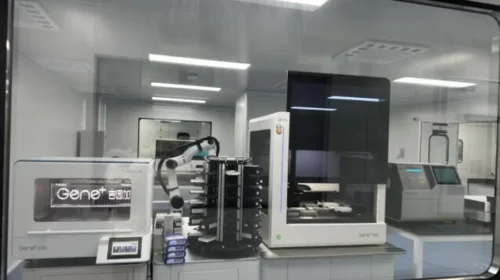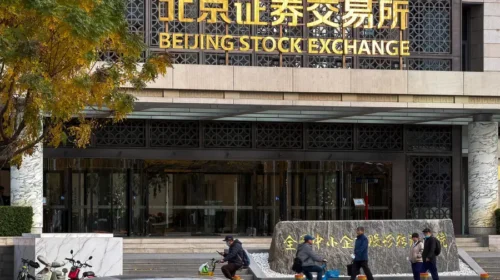HBM rises from the ashes as a research partner for drug giants

The cash-strapped company disposed of a factory and an advanced drug pipeline to stay in business, and is now re-positioning itself as a supplier of biomedical services
Key Takeaways:
- HBM Holdings posted a 9-fold rise in revenues last year, thanks to licensing deals with big names in the global pharma sector
- Orders have been rolling in since the company remodeled itself as a contract research organization
By Molly Wen
Drug developer HBM Holdings Ltd. (2142.HK) will look back on last year as a period of creative destruction, when it sold off assets and changed its business model.
Now pitching itself as a contract research organization (CRO), the biomedical company is enjoying a surge in annual revenue from licensing agreements with global drug giants, as it tries to turn around its finances.
HBM struggled last year when financial problems hit its two fastest-moving drug pipelines. One drug project was suspended, and the other pipeline was sold off. A newly built factory was offloaded before being put to any use. Short on operational cash, the company was forced to retrench to get through tough times.
But as the biomedical sector recovers, the company’s business is looking up. Its earnings report released last Thursday showed annual revenue of $40.66 million, up more than 800% year on year, and its loss was on a par with 2021, at $137 million.
The cash influx has come from licensing agreements with big-name drug partners. Last year, it reached a global licensing agreement with AstraZeneca (AZN.LN) to develop and commercialize a bispecific antibody. HBM secured a prepayment of $25 million and could expect up to $325 million in milestone payments and royalties. In addition, a collaboration with CSPC Pharmaceutical (1093.HK) earned it 150 million yuan up front and is worth a milestone income stream of more than 1 billion yuan.
More deals are being done. In February this year, the company granted exclusive U.S. rights to develop and market one of its anti-cancer antibodies to Cullinan Oncology (CGEM.US), for a prepayment of $25 million and up to $600 million in milestone payments, as well as nearly 20% of sales proceeds as royalties.
HBM is a developer of innovative drugs established in 2016. It obtained a platform for developing human monoclonal antibodies by acquiring the Danish company Harbour Antibodies. In 2017, it bought the rights to develop, produce and commercialize two drugs, batoclimab and tanfanercept, from the Korean company HanAll Biopharma. The two drug projects became its fastest pipelines.
Financial distress
The company was mired in losses for years, relying on external financing to stay in business, as none of its products made it to market. On Sept. 5, 2022, it was ejected from the Stock Connect program that lets mainland investors trade in shares listed in Hong Kong. As the biomedical sector struggled through a credit crunch, HBM was almost entirely cut off from external financing.
By the end of last June, it was sitting on only $200 million in cash and bank deposits. That buffer might have barely lasted a year, after it spent $100 million on R&D and administration expenses in the first half of 2022.
The deal with AstraZeneca last April, although lucrative, was not enough to support the company’s long-term development. Therefore, the management team decided to wield the axe, selling off assets and drastically downsizing drug pipelines.
In October the company announced the sale of batoclimab to CSPC Pharmaceutical, and pulled the plug on late-stage clinical trials for tanfanercept. The sweeping cuts bolstered its cash position in the short term and saved substantial sums that would have been spent on testing and commercialization down the road.
After exiting the two projects that were closest to commercial launch, the company turned its attention to industrial sites. In November it sold a production base in Suzhou to WuXi Vaccines, a subsidiary of Wuxi Biologics (2269.HK), for 145 million yuan, taking a loss of 61.93 million yuan from the sale.
Despite being strapped for cash, the company did not ease off its R&D efforts. It spent $135 million last year on R&D, a year-on-year rise of 26%. But it did slash administration spending by 32% to $27.27 million. Employee costs were cut by nearly half to $14.77 million as the company workforce shrank from 385 employees to 216.
While cutting costs, the company is also seeking new income from the biopharma industry as it transforms itself into an upstream provider of drug discovery services.
Collaborating with Moderna
HBM announced in November it had set up a fully self-funded subsidiary, Nona Biosciences, to provide pre-clinical drug discovery and development services for pharmaceutical partners. The bioscience arm is equipped with a transgenic mouse platform for developing human monoclonal antibodies, along with a platform to produce heavy chain-only antibodies (HCAb).
The transgenic mouse platform is a key engine to develop human monoclonal antibodies and other new types of antibodies.
Orders are already coming in. Moderna (MRNA.US) has signed a cooperation deal to use Nona’s platforms to develop nucleic-acid immunotherapies under which the Chinese company gets $6 million up front and as much as $500 million in milestone payments and royalties.
In late November, Nona also announced a deal with Dragonfly Therapeutics to collaborate on bispecific antibodies and multi-specific antibody therapies. Nona also stands to a benefit from co-ownership of antibody-based drugs that Kelun-Biotech has licensed to Merck & Co. (MRK.US). Nona has a 30% interest in the two co-developed drugs licensed to Merck.
HBM has always attracted plenty of interest from primary investors, from the early days to its pre-IPO financing and launch on the Hong Kong Stock market. Its backers have included Hillhouse Capital, Blackrock, CDH Investments, Legend Capital, China Life Health Fund and other investors in the medical sector.
However, its stock has been on the wane since the market debut. Now trading at HK$2, the share is more than 80% below the IPO price of HK$12.38. HBM’s latest price-to-book (P/B) ratio stands at around 2 times, well below the 8 times of Biocytogen Pharmaceuticals (2315.HK), which also has a transgenic mouse platform for human monoclonal antibodies, suggesting a relative lack of investor confidence.
After months of slashing and burning, HBM intends to operate under an asset-light model. But it remains to be seen whether the pivot to a CRO function will pay off financially in the long run.
To subscribe to Bamboo Works weekly free newsletter, click here





